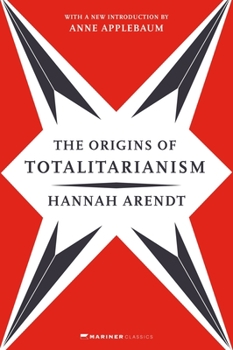The Origins of Totalitarianism
Select Format
Select Condition 
Book Overview
Hannah Arendt's definitive work on totalitarianism--an essential component of any study of twentieth-century political history--now with a new introduction by Anne Applebaum.
In recent years, The Origins of Totalitarianism has become essential reading as we grapple with the rise of autocrats and tyrannical thought across the globe.
The book begins with the rise of anti-Semitism in central and western Europe in the 1800s and continues with an examination of European colonial imperialism from 1884 to the outbreak of World War I.
Hannah Arendt then explores the institutions and operations of totalitarian movements, focusing on the two genuine forms of totalitarian government in our time, Nazi Germany and Stalinist Russia, which she adroitly recognizes were two sides of the same coin, rather than opposing philosophies of Right and Left. From this vantage point, she discusses the evolution of classes into masses, the role of propaganda in dealing with the nontotalitarian world, the use of terror, and the nature of isolation and loneliness as preconditions for total domination.
This edition includes an introduction by Anne Applebaum--a leading voice on authoritarianism and Russian history--who fears that "once again, we are living in a world that Arendt would recognize."






